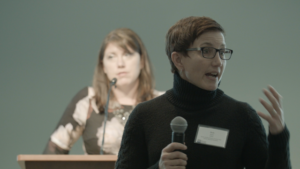 On the weekend of November 9th, amidst the chilling wind of the Blue Ridge Mountains, women leaders from across the state of North Carolina met in Asheville for the 2018 NC Women’s Summit.
On the weekend of November 9th, amidst the chilling wind of the Blue Ridge Mountains, women leaders from across the state of North Carolina met in Asheville for the 2018 NC Women’s Summit.
Women AdvaNCe hosts this event every year, but this happened to be my first summit with the organization. I wasn’t sure exactly what to expect, but by the end of the weekend we discussed the reality of our individual worlds and came together to find concrete solutions for some of the most pressing problems faced by women in our state.
Our weekend began with an event of creative expression. The FemFeels poetry event, hosted by Women AdvaNCe’s own Antionette Kerr, was an opportunity for Summit-goers and community members alike to speak their minds. Poets shared their feelings in a time when people, especially women, are taught that being emotional is a weakness. Our FemFeels performers proved to us that vulnerability is a strength.
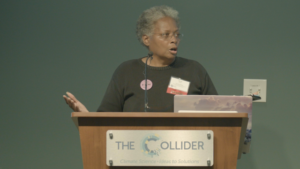 The next day, the Summit began in earnest with breakfast, opening remarks, and words from our keynote speaker, Mandy Carter.
The next day, the Summit began in earnest with breakfast, opening remarks, and words from our keynote speaker, Mandy Carter.
Carter has been fighting for the rights of marginalized people for over 50 years. She was a part of Dr. Martin Luther King, Jr.’s 1968 Poor People’s Campaign, a march on Washington for economic justice that was carried out just months after his assassination. We were honored to have her as a keynote speaker, and to hear her read some of Pauli Murray’s written work for the FemFeels event the previous night.
Throughout the day, attendees gathered into groups led by prominent activists and leaders from across the state. The round table discussions covered a range of topics, including the Equal Rights Amendment, the economic disadvantage of women in our state, and a deconstruction of the midterm elections results.
Ivanna Gonzalez, the Deputy Director of Policy & Alignment at Blueprint NC, led discussion groups about racial equity. She discussed what she and her colleagues have done to dismantle white supremacy within their organization, emphasizing the need for diversity in this effort, not only of identity but also of institutional power. People from every level of the organization have to be involved in anti-racist efforts in order for them to be effective.
“White supremacy often operates in the shadows,” she said during one of the discussions. This quote has stayed with me well after I’ve arrived back in Chapel Hill from the Summit, reminding me that this work requires bringing to light things that are predicated on staying buried.
The #MeToo discussion group, led by Murphy Fletcher, an attorney and Asheville native, addressed the prevalent problem of sexual harassment in the workplace. Fletcher finely articulated the ways in which employers devalue victims’ experiences and discourage them from coming forward. However, she also gave listeners some hope that the #MeToo movement has put pressures on employers to make changes. Many people in these groups shared personal stories of sexual violence, opening up the discussion to how this issue impacts so many of us in attendance.
So many discussions happened around the Collider space that it was impossible to hear them all, but walking through the rooms I caught glimpses of the smart conversations taking place: the economic cost of being a woman in North Carolina, the importance of convincing the NC legislature to ratify the Equal Rights Amendment, the environmental justice that is vital to our state in particular as a large exporter of pork products. While I couldn’t participate in every one, I found myself being rejuvenated by the knowledge that was circling the room.
Over lunch and snacks from Colorful Palate, the Summit gathered together to hear the results of this year’s awards. Each year, Women AdvaNCe seeks to highlight the incredible work that women are doing to champion important issues in our state. These awards serve to identify women and organizations that stand out in their commitment to social change.
Angie Newsome of Carolina Public Press was this year’s winner of the AdvaNCing the Issues award. In her speech, she spoke of the importance of news journalism in this era in which journalists are being actively targeted. She also emphasized the need to bring light to the problems that impact our communities.
“There’s no way to solve domestic violence if we can’t see that our community has a problem with domestic violence,” she said.
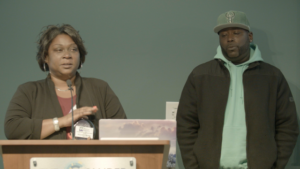
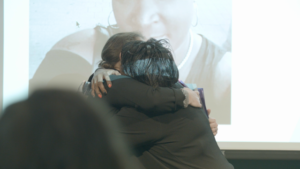 Rolanda Byrd, the Executive Director of Raleigh PACT (Police Accountability Community Task Force) was the winner of AdvaNCing the Change. Byrd likes to refer to herself as an “accidental activist,” because she was motivated to advocate for justice in policing after her son, Akiel Denkins, was brutally murdered by a police officer. Her friend and colleague Ivanna Gonzalez introduced Byrd, ending with the encouraging sentiment, “Because of you, I believe that we will win.”
Rolanda Byrd, the Executive Director of Raleigh PACT (Police Accountability Community Task Force) was the winner of AdvaNCing the Change. Byrd likes to refer to herself as an “accidental activist,” because she was motivated to advocate for justice in policing after her son, Akiel Denkins, was brutally murdered by a police officer. Her friend and colleague Ivanna Gonzalez introduced Byrd, ending with the encouraging sentiment, “Because of you, I believe that we will win.”
Her speech left few dry eyes in the room. She told her story and spoke from the heart, heartened by the award and the support she received from her friends and family. She spoke of her daughter and second son, who inspire her work.
“They give me the strength every day to wake up and continue doing this work,” she said.
In the afternoon, the full group met to discuss how we would move forward after learning from and inspiring each other. We were asked what our dreams are. People said things like initiating cross-generational conversations, educating themselves, and practicing empathy and active listening. The takeaways from this event were wide and deep, showing a true breadth of knowledge, leadership, and intention. I felt assured that the women in our company would go on and accomplish great things in our state, with the backing of the friends they had made at the Summit.
This year was my first Summit, after a deeply fulfilling summer as an intern at Women AdvaNCe, and I walked away feeling energized and ready to take on new challenges.
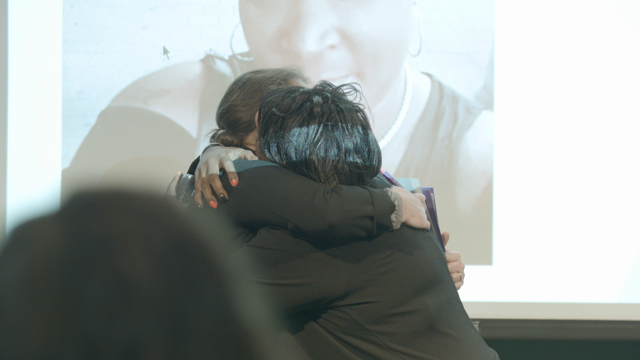
There are no comments
Add yours